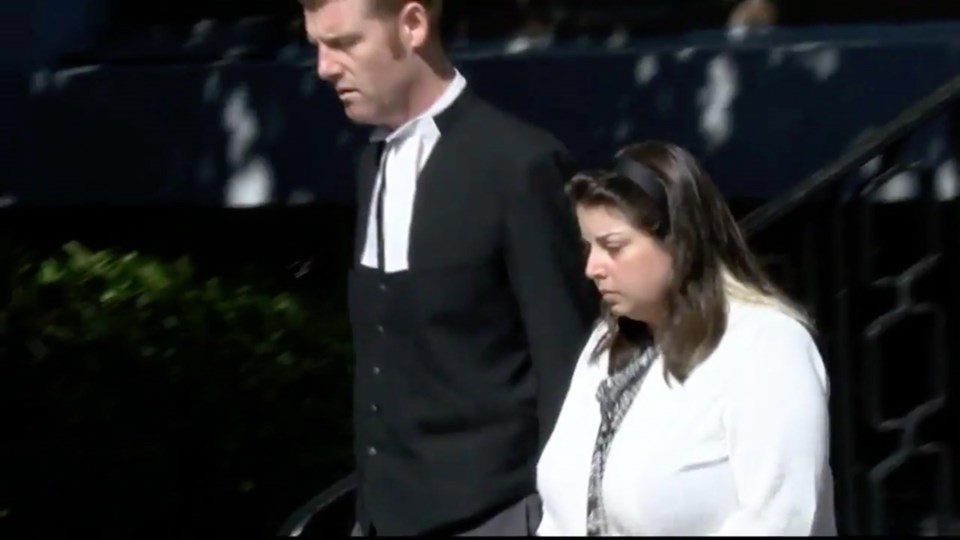A forensic psychiatrist testified Thursday that he had difficulty controlling his emotions during an interview with Kaela Mehl about the death of her 18-month-old daughter, Charlotte.
Dr. Shabhram Lohrasbe, who has testified as an expert witness 600 times and dealt with more than 10 parents who have killed their children, told a B.C. Supreme Court jury his interview with Mehl in May 2017 was one of the most difficult he has done.
“She was so distraught when we started talking about Charlotte. At times I was fearful she was going to have a panic attack,” Lohrasbe said. “She kind of fell apart. Through much of the interview, she took out Charlotte’s toys, grabbed them and pressed them to her chest.”
Mehl is charged with the first-degree murder of her daughter. She has admitted killing Charlotte on the early morning of Sept. 16, 2015, by feeding the child a mixture of yogurt and sleeping pills. The Crown must prove she intended to kill the child and that the act was planned and deliberate.
Lohrasbe, testifying for the defence, was originally asked by the Crown to do a psychiatric assessment of Mehl’s state of mind. After reviewing three volumes of Crown material, speaking with Mehl’s psychiatrist, Dr. David Yaxley, and interviewing Mehl, Lohrasbe concluded that she was in an abnormal mental state called an adjustment disorder when she killed Charlotte. People experience adjustment disorders when they are under so much stress they go off the rails, Lorhasbe explained.
With the breakdown of her marriage and an ugly custody battle underway, Mehl felt increasingly isolated and alone, Lohrasbe testified. She was suffering from sleeplessness and exhaustion. She perceived her father-in-law, Brent Cunningham, as a predatory threat to Charlotte and worried about Charlotte’s safety when the child was with her father, Dan Cunningham, who had been in accidents when he was drinking and driving.
On Sept. 15, the day before she killed Charlotte, Mehl went to West Shore RCMP for help, but was told they couldn’t do much, Lohrasbe said.
Later in the afternoon, she and Dan Cunningham fought during their exchange of Charlotte at the Saanich police station.
After driving away, Mehl received a phone call from a police officer, Lohrasbe said.
“She tried to engage and explain the situation, but was essentially being told: ‘We are not going to be helping you,’ ” Lohrasbe said. “I think that was a very critical thing for her at the time.”
Mehl was with her mother, Leanna Comis, at the time. Toward the end of the call, Comis told Mehl not to raise her voice and to stay calm, warning her it could be held against her.
The two women fought, and Comis left.
Messages were then exchanged that led Mehl to feel completely abandoned, Lohrasbe said.
“It was the second blow to her that night,” he told defence lawyer Kirk Karaszkiewicz.
Lohrasbe classified the case as an altruistic filicide. Killing Charlotte was the best way to prevent pain and suffering for the child, he said. Mehl was feeling isolated and abandoned. Her sense of what was real had been shaken.
“From an outsider’s perspective, it is very difficult to grasp that ending the life of that child is saving that child. … It was amazing that she used the language I heard 25 years ago from a woman who had killed her child: ‘I didn’t see it as killing her. I know it sounds stupid. I saw it as keeping her safe.’ In some strange way, they enter a zone where morality is turned upside down. That’s what I believe happened with her.”
Lohrasbe testified he did not know whether Mehl’s perceptions of her father-in-law were based in reality.
“If she saw him as a predatory threat and there was no basis for that, she was approaching psychosis,” Lohrasbe said. “If there is a basis, then clearly when she felt absolutely hopeless and no one was helping her, she felt she was saving Charlotte.”
Lohrasbe told court that his assessment of Mehl was limited by the passage of time and by the “unusually ugly” breakdown of Mehl’s marriage.
During the interview, Mehl told Lohrasbe she was raised by parents with strong personalities and who often clashed. Things were OK until she was about 10 years old, when her parents left their regular jobs and opened a small bar in rural Alberta. Her father withdrew emotionally and her mother also withdrew from her children and started drinking.
“Those years were tumultuous. She was the older child, the responsible child. At 12, she tended to slip into the parenting role, providing support to each parent,” Lohrasbe testified.
“When they finally broke up many years later, it was extraordinarily ugly, unfortunately, a prelude to the breakdown of her own marriage. The emotional needs of the children were abandoned in that marriage.”
Today, the only person Mehl remains close to is her mother, Lohrasbe said. She is extremely dependent on her.
“As she told me and Dr. Yaxley, she has been continuously suicidal, and I believe she is suicidal now. But Ms. Mehl is concerned her own suicide will destroy her mother. That’s what she is hanging on to now.”
When Mehl was 12, after a bad fight with her mother, her mother said: “Why don’t you just kill yourself? We’d all be better off without you,” Lohrasbe testified.
“Can you imagine the impact on a 12-year-old? I think it has relevance on what she did later.”
Mehl told Lohrasbe that during her marriage she gradually became aware that Cunningham had more of a drinking problem than he let on.
“She described instances, that if accurate, were alarming in terms of him being drunk and not being able to care for the baby.”
She told Lohrasbe the hairs on the back of her neck stood up when her father-in-law told her she could go back to work and he would look after Charlotte.



